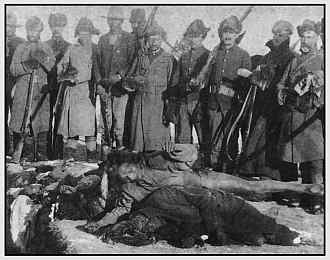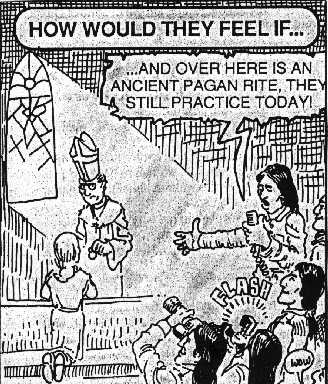 Another Stereotype of the Month entry:
Another Stereotype of the Month entry:
 Another Stereotype of the Month entry:
Another Stereotype of the Month entry:
No Apology to Indians
Monday, June 27, 2005
By: Thomas Bowden
Dear Editor:
The Senate Committee on Indian Affairs is debating whether the United States should formally apologize to Indians for a "long history of official depredations and ill-conceived policies." This proposal should be rejected.
Before Europeans arrived, the scattered tribes occupying North America lived in abject poverty, ignorance, and superstitionónot due to any racial inferiority, but because that is how all mankind starts out (Europeans included). The transfer of Western civilization to this continent was one of the great cultural gifts in recorded history, affording Indians almost effortless access to centuries of European accomplishments in philosophy, science, technology, and government. As a result, today's Indians enjoy a capacity for generating health, wealth, and happiness that their Stone Age ancestors could never have conceived.
From a historical perspective, the proper response to such a gift is not resentment but gratitude. America's policies toward the Indians were generally benign, aimed at protecting them from undeserved harm while providing significant material support and encouragement to become civilized. When those policies erred, it was usually by treating Indians collectively, as "nations" entitled to permanent occupancy of semi-sovereign reservations. Instead, Indians should have been treated as individuals deserving full and equal American citizenship in exchange for embracing individual rights, including private ownership of land.
If the United States government were demanding that Indians apologize for the frontier terrorism of their ancestors, as if living members of a particular race could be guilty of their forebears' misdeeds, the demand would (properly) be rejected as racist. For the same reason, American Indians should refuse to be regarded as a race of helpless victims entitled to a collective apology from their fellow citizens.
Thomas A. Bowden
Ayn Rand Institute

Responses to Bowden
Michael W. Naylor letter: No reason Indians should be grateful
The Forum
Published Sunday, July 10, 2005
In his letter to the editor (Reject proposal to apologize to the Indians, July 2), Thomas Bowden makes the absurd assertion that the conquering Europeans gave American Indians the great gift of Western civilization for which they should be grateful. What he failed to mention is that this wonderful "gift" was wrapped in paper with genocidal print.
It was an expensive "gift" for which American Indians paid with their lives, lands, and culture. Decimated by smallpox, they were the victims of the earliest documented use of biological warfare when Indian combatants in the Pontiac Rebellion were given blankets from the smallpox hospital at Fort Pitt. The "gift" had its desired effect.
The "benign" U.S. policy towards American Indians included starving them onto reservations. In the late 1800s the government pursued a policy to exterminate the bison, the plains Indians' major source of sustenance. The plan was wildly successful. The population of bison, once estimated to be 70 million, was less than 1,000 by the 1890s and the last major Indian uprising at Wounded Knee was quelled.
This "gift" came at the expense of families whose children were kidnapped and placed in boarding schools for assimilation into white society. Children were forced to cut their hair (spiritually symbolic for many native cultures), prohibited from speaking their native tongue, and abused. Children who did not die in these boarding schools found themselves unwelcome in white society and a stranger to their own.
That Bowden fails to understand why Indians were not grateful for the "gift" of Western civilization makes me wonder if he thinks that African Americans should be grateful for slavery. After all, didn't the slave traders rescue their ancestors from living conditions as primitive as the American Indians' and give them the gift of Western civilization?
Michael W. Naylor
(Graduate of Fargo South & NDSU)
Chicago

Young Northwest leaders challenge racism as philosophy
Posted: October 27, 2005
by: Editors Report / Indian Country Today
The ARI is a "think tank" that purports to represent the vanguard of a movement of adherents of the philosophy of "objectivism," brainstorm of noted Russian-American philosopher and novelist Ayn Rand. It has a wide circle of writers and commentators who prodigiously produce opinion pieces and letters to the editor.
Often interesting, if always doctrinaire, ARI's positions grow out of objectivism, in which reason, individualism and capitalism are central guideposts. Objectivists appear strongly libertarian about personal behavior, interestingly against faith-based politics, while being completely domineering and insulting against Indians and Native peoples as legitimate communities of human beings. Their arguments are presented in directly anti-Indian fashion and in the general context of disdain for multi-cultural concerns of any kind. Willing to rail insultingly against entire peoples, they do so with facile arguments spoken gravelly as absolute truths, as if they had no possible response.
So be it -- as many organizations such as this decide purposely to be divisive, to see no trees but for the forest they would happily cut down to impose their favored ideology, even if desolate and bigoted. But there is response. As Vine Deloria Jr. said deliciously once: "We talk, you listen."
Let's consider one argument by ARI writer Thomas A. Bowden, who posits that "[b]efore Europeans arrived, the scattered tribes occupying North America lived in abject poverty, ignorance and superstition."
This preposterously all-encompassing statement fails of its own illogic by lumping hugely diverse situations and cultures together as one.
* "Scattered"? No; the tribes were all very much in place. Even so-called "nomadic" tribes simply moved for economic reasons, but within specific territories and within patterns of long-term inhabitation incomprehensible to most Westerners at the time. These facts obviously remain imperceptible to the bunch at ARI.
* "Abject poverty"? Oh? Like the overcrowded, squalid and disease-incubating cities of Spain, England, France, Germany and Holland? Countries whose destitute peasantry was corralled under lords and kings and who gladly invaded other peoples' lands, stealing everything in sight, killing off indigenous peoples and voraciously consuming all means of natural production?
Periods of want and famine are natural for hunting and gathering cultures; but overall, as Stanley Diamond showed in his book "In Search of the Primitive," the life-supporting economic practices of indigenous peoples (when free from rapacious settlers and exploiters) often provided quite well for human needs and build socially balanced interdependency and inter-support among peoples. This community-building skill is essential for most human societies still connected to their places of origin. Indian poverty was the result of contact with Europeans.

* "Ignorance and superstition"? Oh? As opposed to bleeding diseases out of people, or burning heretics and witches at the stake by the hundreds? Time and again, history shows how Natives' vast, traditional knowledge of natural medicines and food crops, reflecting ages-old concepts and tried-and-true practices, contributed to humankind a huge treasure of productive achievement. In fact, and as but one example, the folks at ARI might starve if they were to stop eating Indian foods. Were there religious excesses in some Native cultures? No doubt. Was there a dialectic of change and progress in its own non-Western logic? Of course.
Bowden tried to soften his superior attitude by asserting that this reality of lesser human quality, the inferiority of the Natives, is "not due to any racial inferiority, but because that is how all mankind starts out (Europeans included)."
The "science" of the ascendant steps to "civilization" is what all human societies are assumed to go through. You know, "white man's burden" and all that. No doubt human societies and cultures grow, shrink, adapt and even progress. But implicit in Bowden's old-hat argument is that the European is beyond the "state of barbarism," whereas the Indians were or are not. This explains the "superiority" straightaway, as inherent in the relationship between the "developed West" and the rest of the peoples of the world.
He is saying: "We went through the steps of civilization and you did not. Ergo, we are superior to you." Such an assumption of superiority sets the rationalizations, and positions the true motivations that follow -- namely, the legitimization of conquest and the stealing of Indian land and resources.
Bowden argued that America's policies toward Indians, which he described as "generally benign," only erred by "treating Indians collectively, as 'nations' entitled to permanent occupancy of semi-sovereign reservations."
He went on, in the most brazen language of the U.S. termination policy era, that "[i]nstead, Indians should have been treated as individuals deserving full and equal American citizenship in exchange for embracing individual rights, including private ownership of land." Of course, any serious student of American Indian history can read between these lines. By destroying Indian governments, their lands are opened up to non-Indian ownership, a la the General Allotment Act or Dawes Act of 1887.
Rob's reply
What? Someone from the Ayn Rand Institute is touting the superiority of genocidal Europeans and it isn't even Columbus Day?
Naylor effectively rebutted Bowden's moral claims. Here are some additional points:

>> Before Europeans arrived, the scattered tribes occupying North America lived in abject poverty, ignorance, and superstition <<
The only thing ignorant is this statement.
Poverty? The dictionary defines poverty as "the lack of the means of providing material needs or comforts." Except for the occasional shortage of food, Indians didn't lack anything. They had everything they needed to lead healthy, fulfilling lives.
How was the Indians' situation any different from that of the typical European peasant? The vast majority of the European masses lived a hardscrabble, hand-to-mouth existence. Their lives were just as "nasty, brutish, and short" as the Indians' supposedly were.
Europeans came to America to get away from the intolerable conditions they lived in. They wanted to live less like their ancestors and more like Indians. The advantages of Indian life were clear, which is why most Indian captives chose to stay with their captors.
What advantages? Well, before Columbus, Indians didn't experience continent-wide plagues or decades-long wars. They weren't mired in debt or locked up in poorhouses. Instead of bowing to kings, lords, and bishops, they chose their own leaders. Instead of being enthralled to a master, they were free to roam.
Ignorance? Of what? That the world was flat? That the sun revolved around the earth? That the Bible was the inerrant word of God? That the king was divine and the pope was infallible? That the best way to kill witches was to burn them at the stake?
True, they were ignorant of gunpowder, steel, and the printing press. They were ignorant of many things: feudalism, taxation, tithes, crusades, pogroms, blasphemy, drunkenness, sewage, filth, jails, dungeons, the rack, etc. They were arguably better off not knowing about these things.
Superstition? What, they believed that God was a old man with a beard? That someone could rise from the dead or change water into wine? Or deliver presents to the world's children in one night? That black cats and the number 13 are bad luck? That saying "bless you" after someone sneezes is good luck?
News flash: All religions are superstitious, since they're all based on faith rather than fact. One person's religion is another person's superstition.
>> The transfer of Western civilization to this continent was one of the great cultural gifts in recorded history <<

For a response to this, see Indian Givers: How Indians Transformed the World by Jack Weatherford. See also:
Multicultural origins of civilization>> affording Indians almost effortless access to centuries of European accomplishments in philosophy, science, technology, and government. <<
Science and technology, perhaps, if you don't include things like agriculture or medicine. But philosophy and government? I hate to break it to Bowden, but Europe's monarchies weren't following the Athenian model in 1492. Europeans had less freedom, democracy, and equality than Indians did. The visitors embraced these ideals as they came to America and mingled with the natives.
For more on the subject, see:
Indians gave us enlightenment>> As a result, today's Indians enjoy a capacity for generating health, wealth, and happiness that their Stone Age ancestors could never have conceived. <<
Health? The Indians suffered fewer plagues than their contemporaries in Europe did. They were arguably healthier than their Caucasian counterparts. They definitely had better hygiene than the Europeans did.
Wealth? Money is the root of all evil. Just as Indians weren't poor, they had no desire or need to be rich. They had everything they needed without punching a timeclock, paying a tithe, or putting away something for their retirement.

Happiness? Indians had their health and didn't need European-style wealth. Who says they weren't happy already? What would they gain by "generating" wealth: a lifetime of slaving to pay off their overlords?
Incidentally, some Indian cultures used metals, not just stones, when the Europeans encountered them. That put them beyond the Stone Age.
>> America's policies toward the Indians were generally benign, aimed at protecting them from undeserved harm while providing significant material support and encouragement to become civilized. <<
I didn't know "benign" was synonymous for "rapacious."
America's policies caused undeserved harm to the Indians.
The only material support these policies provided was in exchange for the land the Indians gave up. The Americans didn't uphold their obligations to provide support and they reaped the benefits of the resources they stole.
>> When those policies erred, it was usually by treating Indians collectively, as "nations" entitled to permanent occupancy of semi-sovereign reservations. <<
Pure libertarian rubbish. Studies have shown that sovereignty is the best thing tribes have going for them.
>> Instead, Indians should have been treated as individuals deserving full and equal American citizenship in exchange for embracing individual rights, including private ownership of land. <<
Indians have been American citizens since 1924, although the country could've made them citizens earlier. Indians already "embrace individual rights, including private ownership of land." But they don't embrace the failed policy of allotment. See Tierney: Federal Bureaucracies Caused Indians' Downfall for more information.
|
. . . |

|
All material © copyright its original owners, except where noted.
Original text and pictures © copyright 2007 by Robert Schmidt.
Copyrighted material is posted under the Fair Use provision of the Copyright Act,
which allows copying for nonprofit educational uses including criticism and commentary.
Comments sent to the publisher become the property of Blue Corn Comics
and may be used in other postings without permission.